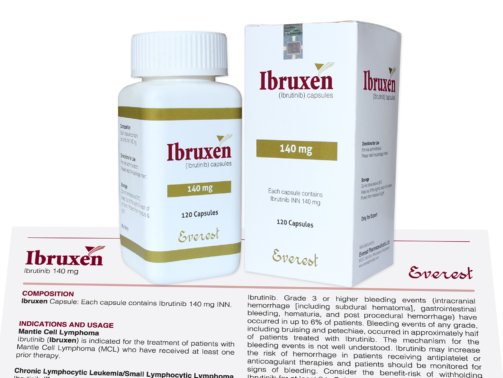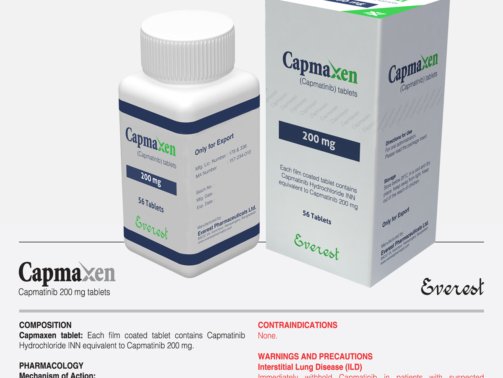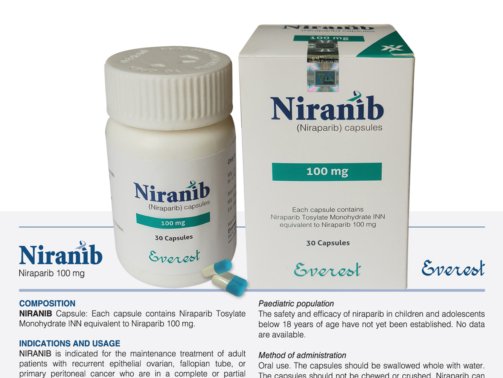Brigatinib 180 mg (Alunbrig)
0.00$
BRIGANIX is indicated for the treatment of patients with anaplastic lymphoma kinase (ALK)-positive metastatic non-small cell lung cancer (NSCLC) who have progressed on or are intolerant to crizotinib. This indication is approved under accelerated approval based on tumor response rate and duration of response. Continued approval for this indication may be contingent upon verification and description of clinical benefit in a confirmatory trial.
- Nausea
- Fatigue
- Diarrhea
- Cough
- Headache
- Muscle pain
- Increased blood pressure
Brigatinib is an approved oral targeted medication for the treatment of non-small cell lung cancer (NSCLC), and it is sold under the trade name Alunbrig. Patients with anaplastic lymphoma kinase-positive (ALK+) non-small cell lung cancer (NSCLC) who have progressed on crizotinib, another ALK inhibitor, or who are intolerant to it are specifically treated with it. ALK resistant mutations can be inhibited by the next-generation ALK inhibitor brentinib, which has a wide range of activity and increased efficacy.
Mechanism of Action
As a tyrosine kinase inhibitor (TKI), brentinib targets the insulin-like growth factor-1 receptor (IGF-1R), ROS1, and ALK. It functions by preventing the aberrant ALK fusion proteins that promote the growth and survival of cancer cells. The medication is a good choice for individuals with treatment-resistant ALK+ NSCLC since it has action against a variety of ALK mutations that give resistance to first-generation inhibitors like crizotinib.
Indications and Usage
Alunbrig is recommended for adult patients with ALK+ metastatic non-small cell lung cancer (NSCLC) who have received crizotinib treatment in the past. It is also being considered for frontline therapy because of its safety profile and effectiveness in clinical trials. The medication comes in a variety of dosages, but the most often prescribed maintenance dose after a seven-day initial 90 mg daily is 180 mg.
Dosage and Administration
Alunbrig is prescribed at a starting dose of 90 mg once day for the first seven days, and then increased to 180 mg once daily as tolerated. Considered the full therapeutic dose, 180 mg aids in maintaining long-term suppression of ALK signaling. It is recommended to take the tablets at the same time every day, with or without meals, and to swallow them whole without breaking them up or chewing them.
Pharmacokinetics
Because of its half-life of about 25 hours, brentinib can be used once day. It is mostly eliminated through urine and feces, and the liver enzyme CYP3A4 is chiefly responsible for its metabolism. It is important to take into account drug interactions with CYP3A inducers or inhibitors since they may affect the plasma levels of brigatinib.
Efficacy and Clinical Trials
Brantinib has demonstrated significant therapeutic effect in ALK+ NSCLC, particularly in patients who have developed a resistance to crizotinib. In the ALTA (ALK in Lung Cancer Trial of Brigatinib) clinical trial, the drug’s objective response rate (ORR) at 180 mg was around 56%, and its median progression-free survival (PFS) was approximately 16.7 months. Additionally, it has demonstrated great potential in treating and preventing brain metastases, which are a common issue in ALK+ NSCLC.
Side Effects and Safety Profile
Common side effects of brigatinib include:
More severe side effects, like pneumonia or interstitial lung disease (ILD), are possible for some people and are most likely to happen within the first week of treatment. A progressive dose strategy (90 mg to 180 mg) is advised because of this risk. Bradycardia, hepatotoxicity, and hypertension are additional possible severe adverse effects. It is recommended that blood pressure, heart function, and liver enzymes be regularly monitored.
Warnings and Precautions
Patients with interstitial lung disease (ILD) or pneumonia should be constantly watched for symptoms like fever, coughing, and dyspnea.
Hypertension: It’s important to routinely check and adjust blood pressure as necessary.
Bradycardia: Patients who exhibit symptoms such as lightheadedness or fainting should have their dosages adjusted.
Hepatotoxicity: Periodically, liver function tests should be carried out.
Myalgia and Elevation of Creatine Phosphokinase: It is important to keep an eye on both muscle complaints and enzyme levels.
Hyperglycemia: Patients with diabetes or risk factors for hyperglycemia should have their blood glucose levels checked.
Drug Interactions
Because brentinib is metabolized by CYP3A4, powerful CYP3A inducers (like rifampin and carbamazepine) or inhibitors (like ketoconazole and itraconazole) might alter its plasma levels. Prior to taking herbal supplements like St. John’s Wort together with other drugs, patients should speak with their doctor.
Special Populations
Effective contraception should be used during treatment and for at least four months following the last dose of bragitinib since it may harm the fetus. It is not advised to breastfeed while undergoing treatment.
Elderly Patients: Considering the health status of each patient, care should be taken, but no appreciable variations in efficacy or safety have been noted.
Hepatic and Renal Impairment: Patients with severe hepatic or renal impairment may need to adjust their dosage.
Storage and Handling
Alunbrig tablets should be kept out of direct sunlight and at room temperature (20°C to 25°C, or 68°F to 77°F). Keep it out of children’s reach and in its original container.
Conclusion
Bragitinib 180 mg (Alunbrig), a potent and effective second-generation ALK inhibitor, can be used to treat ALK+ NSCLC, particularly in patients who have developed a resistance to crizotinib. Because of its considerable effectiveness, especially against brain metastases, and manageable safety profile, brentinib is a good treatment option for those with ALK+ NSCLC. With consistent monitoring and adherence to recommended precautions, its therapeutic benefits are maximized while possible risks are reduced.
Order Now At Mdx Pharma bd….
To order from MDX Pharma BD, visit their website at https://mdxpharmabd.com, where you can browse products and place orders online. For inquiries or orders via email, contact emedicarepharma@gmail.com. Alternatively, call (+88) 01929123476. Their address is 29, Abdullahpur, Uttara, Dhaka-1230, Bangladesh.
1. What is the name of the brigatinib brand?
Ariad Pharmaceuticals, Inc. is developing bragitinib, a small-molecule targeted cancer treatment that is marketed under several brand names, including Alunbrig. Brigatinib inhibits the epidermal growth factor receptor (EGFR) as well as the anaplastic lymphoma kinase (ALK).
2. What is ALUNBRIG’s generic name?
Patients with anaplastic lymphoma kinase (ALK)-positive metastatic non-small cell lung cancer (NSCLC) who have progressed on crizotinib or who are intolerant to it can be treated with alunbrig (brigatinib), a kinase inhibitor.
3. What is ALUNBRIG’s dosage?
Administration & Dosage Guidelines for ALUNBRIG® (brigatinib)
For the first seven days, ALUNBRIG is prescribed at a dose of 90 mg once day; after that, the dosage should be increased to 180 mg once daily.
4. What is the maximum duration of brigatinib use?
As long as brigatinib is effective and the side effects are manageable, you keep taking it.
5. Is alectinib inferior to brigatinib?
The alectinib group’s objective response rate was 92.5%, whereas the brigatinib group’s was 93.8%. The two groups did not differ significantly (p=0.53; 95% CI, 0.28 to 6.07) (Table 2). The alectinib group’s intracranial ORR was 92.7% (38/41) while the brigatinib group’s was 100% (10/10).
6. Is weight gain a side effect of brigatinib?
Additionally, bragitinib may alter weight and appetite. While some patients may notice an increase in hunger and consequent weight gain, others may report a decrease in appetite and consequent weight loss. Throughout treatment, it’s critical to keep an eye on nutritional intake and consume a balanced diet.
7. What time of day is ideal for taking Eltrombopag?
Typically, it is taken once daily on an empty stomach, either two hours after eating or at least one hour before. Every day, take eltrombopag at roughly the same time. Pay close attention to the instructions on your prescription label, and ask your pharmacist or doctor to clarify any parts you don’t understand.
| Product Name | Briganix |
|---|---|
| Generic Name | Brigatinib |
| Formulation | Tablet |
| Available Pack Size | 30’s Pot |
| Available Strength | 90 mg, 180 mg |

 Cart is empty
Cart is empty 



